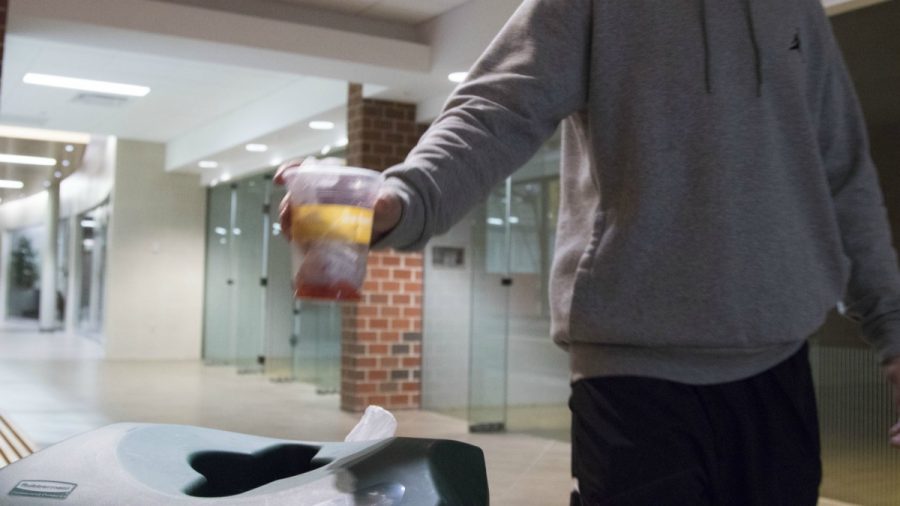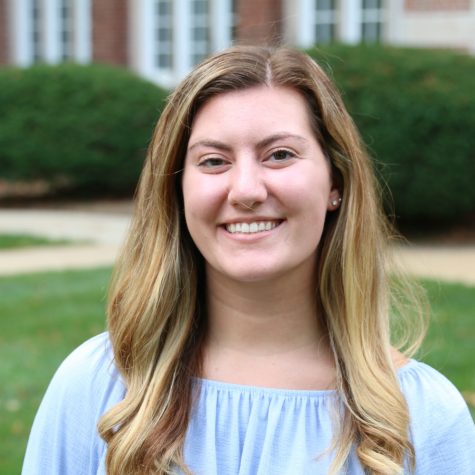It’s easier to recycle now thanks to these initiatives
November 19, 2017
INDIANOLA, Iowa — The Sustainability Club and Student Government Association are working with facilities and waste management to implement new recycling bins and a new work study position to aid in Simpson’s recycling program.
The average college student produces 640 pounds of solid waste each year, including 500 disposable cups and 320 pounds of paper, according to the Environmental Protection Agency.
Simpson College, along with other colleges and universities across the country, implement recycling programs in hopes students will pick up the habit of recycling and reduce the waste.
New recycling bins were added to each floor of the freshman and sophomore residence halls this year. These were added to increase the ease of recycling. Instead of taking recycling outside to the large recycling bins, students can now recycle without leaving their floor.
According to a study done by the US National Institutes of Health, college campuses that increased access to recycling bins led to improved recycling habits among students.
“People don’t want to go outside, especially when it’s cold, to empty their recycling bins,” said Molly Fisher, a sophomore class senator. “Students are more apt to recycle if there are bins inside.”
Fisher has been working on SGA to improve recycling on campus through the capital improvement project. She said the intent is to start a chain reaction with first- and second-year students picking up the habit of recycling and continuing to recycle in their apartments and after they graduate from college.
Sophomore Maggie Flowers, who is president of the Sustainability Club, said this initiative might expand to apartment housing in the future.
A new work study was hired two weeks ago to sort through and empty these recycling bins each week.
A big issue in previous years was contamination of recyclables with trash. When people don’t know what they can and can’t recycle, it causes more waste, Flowers said.
Flowers, who is also a community adviser in Barker Hall, said there is a list of recyclable items and nonrecyclable items on the inside of each student’s door.
However, this list does not exactly correspond with what waste management deems recyclable. This becomes problematic because waste management decides if a recycling bin is contaminated or not. If a bin is contaminated, everything in it must be thrown out and not recycled.
Flowers said she talked to her area coordinator about getting signs with waste management’s information on recyclable items to hang in residence halls.
These signs will go inside the recycling closets. The recycling work study will go through those bins and take out nonrecyclables so there won’t be as big of a contamination issue this year, Flowers hopes.
“Even on a small campus like Simpson, there’s a ton of waste, and it’s sad that so much of it goes into landfills and can’t be reused,” Flowers said.
Fisher said Simpson facilities helped the process by ordering the new recycling bins and setting them out in their designated areas.
Misinformation and education about recycling is an issue, Fisher said.
“Some people don’t care about recycling, but others just don’t know,” junior Madi Paulson said. “The recycling bins could be labeled more clearly so students don’t accidentally throw their trash into the recycling bins.”
Freshman Cami Schmalz is also interested in sustainability. She’s looking into starting a composting project to eliminate waste on campus and put it to better use.
“I know we have a food recovery program that donates extra food to various churches, but there are limitations to what they can give away,” Schmalz said. “The composting project would hopefully find a way to put everything that’s compostable to good use.”
Schmalz said this project would be a good way to help the earth and our campus.
SGA’s prairie project and the Sustainability Club’s pollinator garden are other projects intended to increase sustainability on campus.
Fisher is open to answering any questions from those who want to recycle but aren’t sure how they can do their part. To contact her, email molly.fisher@my.simpson.edu.







